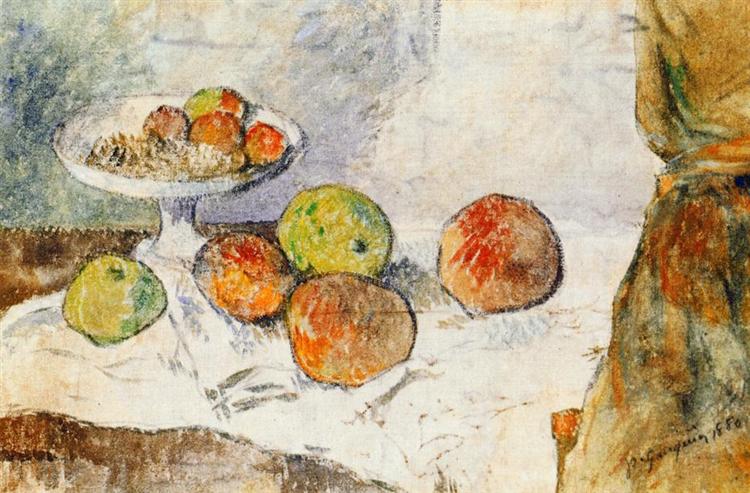Popis
Paul Gauguin's Still Life with a Plate of Fruit (1880) is a clear testament to the artist's mastery in exploring light, color and form, as well as his constant search to translate reality through subjectivity. Although this piece could be considered part of the still life genre, Gauguin's interpretation goes beyond a simple representation of inanimate objects; it is a dialogue between nature and the viewer, loaded with symbolism and emotions.
In this painting, the viewer is greeted by a rich color palette, dominated by the warm, vibrant hues that are characteristic of Gauguin’s work. The bright colors of the fruits, from yellows and oranges to greens and purples, are arranged on a plate that takes center stage in the composition. This use of color not only catches the eye, but also evokes a sense of joy and abundance, inviting contemplation. The way the shadows blend with the light on the surfaces of the fruits reveals a mastery in the manipulation of light, suggesting both volume and freshness.
The composition of the work is remarkably balanced, with the plate of fruit acting as the main focus surrounded by a background that, while less detailed, complements the vibrant display of fruit. Gauguin, with his distinctive technique, employs broad, almost sinuous brushstrokes that bring the elements of the still life to life, moving away from the hyperrealism that dominated the art of his time. This manner of brushwork becomes a statement by Gauguin himself about the importance of artistic expression over mere faithful representation.
In addition to its distinctive style, this work reflects Gauguin's transition toward symbolism and the use of color as a means of conveying mood and emotion. As he moved away from the academic tradition, Gauguin began to prioritize the expressive qualities of color and composition, which in Still Life with a Plate of Fruit is manifested in the intensity of coloration and simplification of forms. Such an approach would be a precursor to his later exploration in his most recognized works, where abstraction and stylism merge with cultural and spiritual themes.
Gauguin, a pioneer of Post-Impressionism, was noted for his search for new ways to interpret and represent reality, which led him to explore diverse cultures, especially during his time in Tahiti. However, in this early work, the essence of his artistic vision is found in its purest form. While "Still Life with a Plate of Fruit" may not capture the more exotic iconography that would later characterize Gauguin's work, it represents the phase in which he begins to redefine his approach to art through color and form.
In short, Still Life with a Plate of Fruit is more than a depiction of everyday life; it is an iconic example of the evolution of an artist who ventures into less conventional terrain. The visual elements in this work, coupled with the bold color palette, offer us a glimpse into the complexity of Gauguin's artistic thought, anticipating his groundbreaking contribution to modern art. This work invites the viewer to contemplate the world in a new light, where the beauty of color and form become a necessity of expression rather than mere objects of observation.
KUADROS ©, a famous painting on your wall.
Hand-made oil painting reproductions, with the quality of professional artists and the distinctive seal of KUADROS ©.
Painting reproduction service with satisfaction guarantee. If you are not completely satisfied with the replica of your painting, we will refund 100% of your money.

